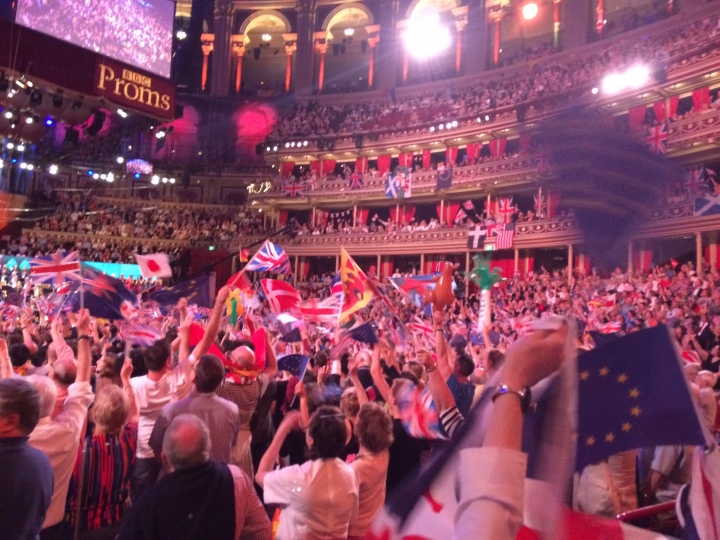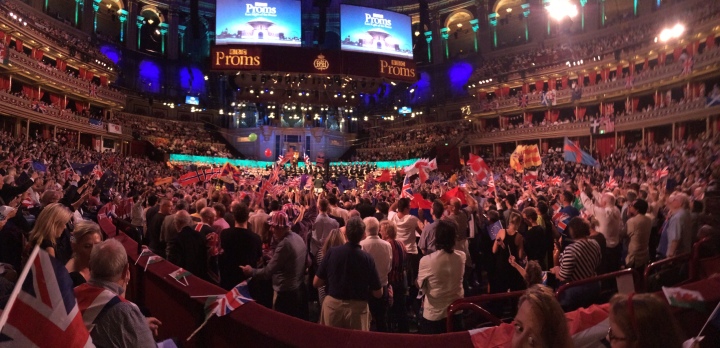Two years ago I wrote an article about the disjuncture between the iconic Last Night of the Proms and the fantastic series of concerts that precedes it. By sheer chance ( a friend asking about returns an hour after some new seats had been released ) I got hold of tickets for the Last Night of the Proms this year, and attended relishing the chance to test my points from 2014.

In my original article I made two broad points. Firstly that The Last Night of the Proms was so unlike the rest of the Proms series in terms of content, [in]accessibility and structure that ‘The Last Night’ is as good as a misnomer. Secondly I expressed discomfort at the unquestioned, militaristic nationalism, which was part and parcel of Empire and British Colonial endeavours in the time it was first put together.
Both of these points are of serious contemporary importance, both musically and politically. Inequality in the UK has been accelerating sharply since 1979 and economic recessions in recent years have exacerbated this effect[1]. Accessibility to cultural events and life-enriching opportunities is increasingly out of the reach of many, and tickets to the Last Night of the Proms are incredibly expensive. Our tickets were only £44, as they were returns with restricted view – however nearby seats were being sold at online on the day for over £700 each, and all other concert-goers my Prom buddy and I spoke to on the evening had paid well into the three-figure range for their tickets direct from the Royal Albert Hall. I therefore stand by the financial aspect of my point about inaccessibility – despite our fluke, the Last Night of the Proms is not open to the vast majority of people unless they have significant disposable income or are willing and able to Prom for the whole day[2].
The balance of new, British, straight-laced classical and world music was well tempered, with the opening piece well-pitched as an example of new music. It both pushed the boundaries of music today but remained within accessible bounds for non-academic music lovers, which reinforced the Proms’ encouragement of exploration of new music.
Most important was the atmosphere, although having a reputation for ‘upper-middle class tomfoolery’ that could be alienating for some, was on this occasion genuinely light-hearted and warm. I feel that there is an excessive sense of seriousness surrounding Western Classical music, and that contributes to many people’s sense that it is something ‘not for them’. Although it is important to be able to hear the music and not be excessively, unnecessarily disturbed, the Last Night had the atmosphere of a party that is lacking at other concerts, even at other Proms. Perhaps the other concerts in the series would benefit from short addresses from the conductor or other performers to increase the sense of connection between stage and audience and better introduce the work performed? Indeed some classical concerts do take this form, and many performers find the opportunity to address and welcome their audience an essential part of bringing them into their musical world. The sense of being relaxed around classical music is key to its future and central to the continuing development of cultural accessibility.
The nationalistic, neo-colonial tone of the second half received even more attention than ever before in this year of the EU Referendum. The dissemination of EU flags outside the event was seen as a controversial protest, and many feared clashes between In and Out factions. However as a musician I never doubted that the flags of the EU and Britain would be united at this event. It is a simple fact that all world-leading musical ensembles are international affairs –there must be so few exceptions I cannot even bring one to mind. Music has always been a thoroughly international endeavour as far back as the naturalisation of Handel in England and the exchange of composers between courts in the European Renaissance. Therefore even the musical traditions that inform nationalist works are not isolated. At a very banal level, Arne would never have been able to record Rule! Brittania without the use of the Italian notation system and the European advances in Baroque music that were ongoing at the time he was writing it.
I personally felt extremely uncomfortable during Rule! Britannia and Land of Hope and Glory, for the first time ever. I am aware that I am more actively politically involved than most people, but I used to really love and feel pride in those numbers at an earlier time in my life. In the context of pressing current affairs and social attitudes, it felt a little excessive to me. However most people enjoyed it thoroughly, and the diversity of flags waving dissipated any sense that this was necessarily a narrow-focused point being made. Conductor Sakari Oramo is to be congratulated on the gentle and uncontroversial tone in which he spoke of music’s inherent border-crossing universality.
A colleague of mine reflected that although the Nationalistic music at the end of the Last Night has deeply entrenched colonial connotations, unless we continue to perform and consider them new connotations and links will never be made with them. This thought gives me great hope. Music is, after all, the ultimate abstract representation. Interpretation of the performer and of every listener is all its essence. We can choose how and when to deploy certain pieces and work to loose them from past contexts, and make them into something meaningful for the new. However, I struggled for days to see how the words from Land of Hope and Glory (‘May her [Britain’s] bounds be wider set) could ever be entirely disentangled from the expansionist colonial programme to which they referred. Later I realised that ironically, if we take the words in today’s internationalist context, Land of Hope and Glory may after all be one of the strongest Remain sentiments expressible. If we can use the words to look beyond our shores, the words and music may be recast as a Liberal call for regional or global unity in “equal laws… by Freedom gained, by Truth maintained.”

[1] Source: https://www.equalitytrust.org.uk/how-has-inequality-changed
[2] In addition to gain access to the Last Night of the Proms concert-goers must present stubs of tickets from 5 earlier concerts in the series. Therefore queueing on the day for tickets (Promming) is effectively only open to Londoners or people who can afford to both attend Proms concerts and travel significant distances to do so.